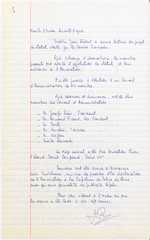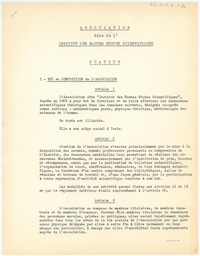The scientific heritage of IHES
Who was Léon Motchane?

Léon Motchane was born in Saint Petersburg in 1900. He studied at Lausanne, where he worked as a physics assistant for a year. Although he left academia for business, he continued to take a keen interest in mathematics, physics and sociology. During the war, he contributed to the Éditions de Minuit. He published two essays under the pseudonym Thimerais, including La Pensée patiente in 1943. His love of mathematics led him to submitting a thesis at the age of 54 and to planning the creation of the Institute.
Inaugural general meeting, June 27, 1958


Maurice Ponte, president of the Compagnie générale de télégraphie sans fil (CSF),
together with Pierre Dreyfus and Fernand Picard, respectively president and engineer at Renault, provided
Léon Motchane with the initial funding he needed to set up his institute. These very active supporters were
quick to help rally other major industry leaders to the cause, especially from the oil and automotive industries.
On June 27, 1958, in the office of Joseph Pérès, then dean of the Orsay Science Faculty and the first president
of IHES, Léon Motchane declared that he wanted to “stop the French brain drain to the United States”.
The Institute came into being and Motchane, who had been responsible for most of the preliminary work,
became its first director.

Fundamental research
Léon Motchane was clear about two things: fundamental research had to be supported by industry leaders, and researchers had to enjoy complete freedom in their work. Those two elements represent the Institute’s keystone.
“Scientific research is not a natural phenomenon that occurs automatically in universities, rather, it is an
activity that needs nurturing, can be cultivated and provides those countries that have an abundance of it
considerable additional prestige and political power”.
“The truly modern aspect of scientific research lies in the fact that the work of industry executives and
engineers is not so far removed from that of theoretical physicists, however abstract their research might be,
and progress from the latter is crucial to the former.”
Extracts from Note sur la recherche fondamentale, Léon Motchane, 1959.
"The importance of advances in exact sciences is today’s most widely acknowledged truth. However, Henri Poincaré’s work tells us that even non-mathematicians know that progress can neither exist nor be fruitful unless very general and disinterested research can be undertaken without cease. Intellectual capacity is unlikely to suffice for success in that enterprise. It seems to me that much courage, personality and no small degree of abnegation is needed to devote years of work in pursuit of a goal that may never be reached. What better proof of idealism for others and for oneself ?”
Extract of a letter from Gabrielle Reinach to Joseph Pérès, 06/23/1958
Gabrielle Reinach was the Institute's first donor.




